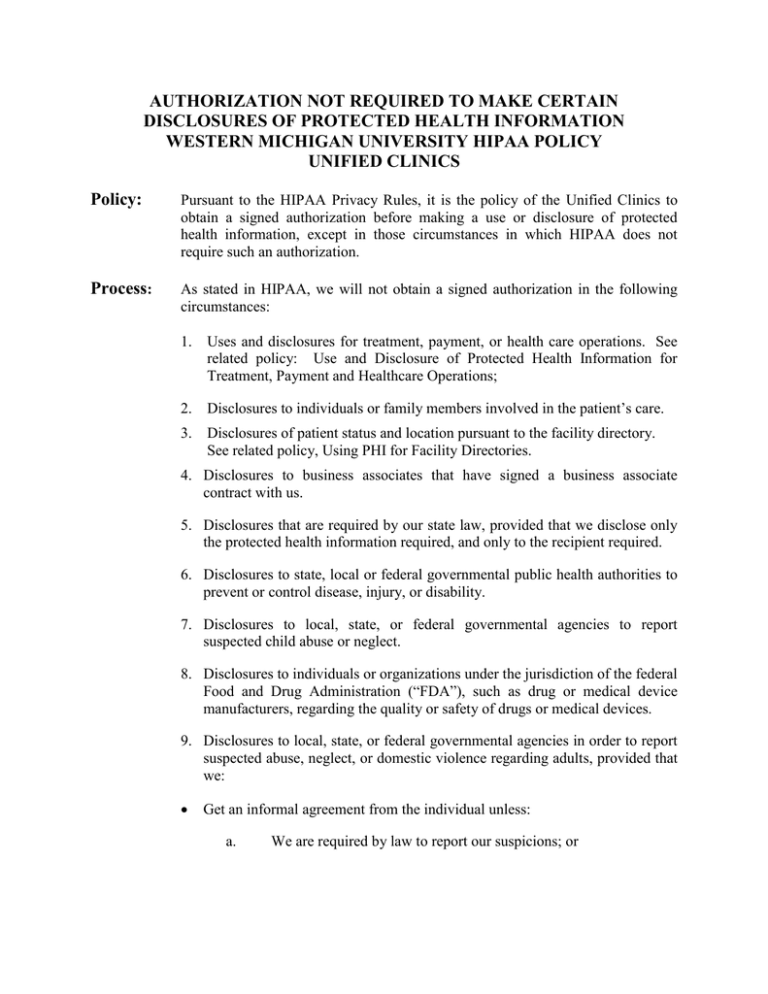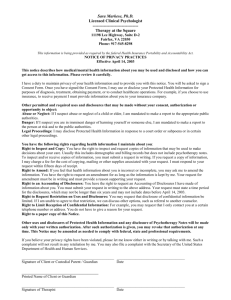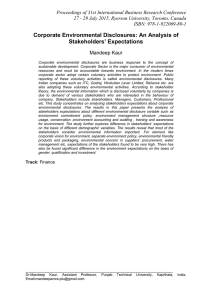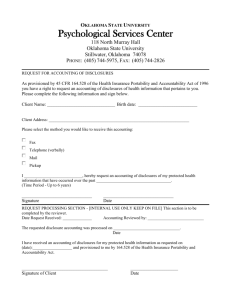AUTHORIZATION NOT REQUIRED TO MAKE CERTAIN DISCLOSURES OF PROTECTED HEALTH INFORMATION
advertisement

AUTHORIZATION NOT REQUIRED TO MAKE CERTAIN DISCLOSURES OF PROTECTED HEALTH INFORMATION WESTERN MICHIGAN UNIVERSITY HIPAA POLICY UNIFIED CLINICS Policy: Pursuant to the HIPAA Privacy Rules, it is the policy of the Unified Clinics to obtain a signed authorization before making a use or disclosure of protected health information, except in those circumstances in which HIPAA does not require such an authorization. Process: As stated in HIPAA, we will not obtain a signed authorization in the following circumstances: 1. Uses and disclosures for treatment, payment, or health care operations. See related policy: Use and Disclosure of Protected Health Information for Treatment, Payment and Healthcare Operations; 2. Disclosures to individuals or family members involved in the patient’s care. 3. Disclosures of patient status and location pursuant to the facility directory. See related policy, Using PHI for Facility Directories. 4. Disclosures to business associates that have signed a business associate contract with us. 5. Disclosures that are required by our state law, provided that we disclose only the protected health information required, and only to the recipient required. 6. Disclosures to state, local or federal governmental public health authorities to prevent or control disease, injury, or disability. 7. Disclosures to local, state, or federal governmental agencies to report suspected child abuse or neglect. 8. Disclosures to individuals or organizations under the jurisdiction of the federal Food and Drug Administration (“FDA”), such as drug or medical device manufacturers, regarding the quality or safety of drugs or medical devices. 9. Disclosures to local, state, or federal governmental agencies in order to report suspected abuse, neglect, or domestic violence regarding adults, provided that we: Get an informal agreement from the individual unless: a. We are required by law to report our suspicions; or b. We are permitted, but not required by law to disclose the protected health information, and we believe that a report is necessary to prevent harm to the individual or other potential victims. We tell the individual that we are making this disclosure, unless: a. Telling the individual would put the individual at risk for serious harm; or b. Someone else is acting on behalf of the individual and we think that this person is the abuser and that telling him or her would not be in the best interest of the individual. 10. Disclosures for health oversight audits, investigations, or disciplinary activities, provided that we only disclose to a federal, state or local governmental agency (or a private person or organization acting under contract with or grant of authority from the governmental agency) that is authorized by law to conduct oversight activities. 11. Disclosures to funeral directors and medical examiners upon death of a patient to enable them to carry out their lawful duties. 12. Disclosures for cadaveric organ, eye or tissue donation purposes. 13. Disclosures for research purposes when approved by the University’s Institutional Review Board. 14. Disclosures in response to a court order, provided that we disclose only the protected health information ordered, and only to the person ordered. 15. Disclosures to police or other law enforcement officers regarding a crime that we think happened at our facility, provided that we reasonably believe that the protected health information is evidence of a crime. 16. If at any time a proposed use or disclosure does not fit into one of the exceptions to the need for an authorization described in paragraphs 1 through 15, we will obtain a signed authorization before making the use or disclosure. Regulatory Authority: 45 C.F.R. §164.500 et. seq. Related Policies/Procedures: Notice of Privacy Practices History: Adopted: April 10, 2003 Effective Date: April 14, 2003 2


